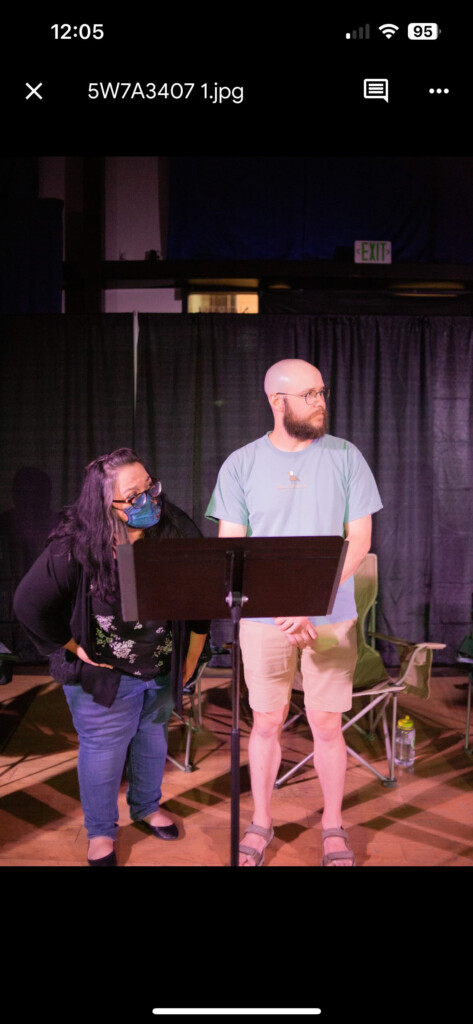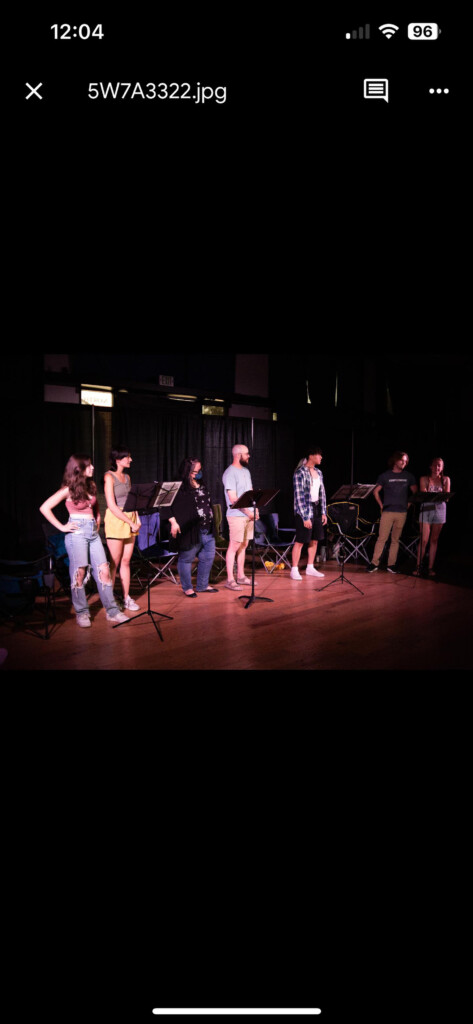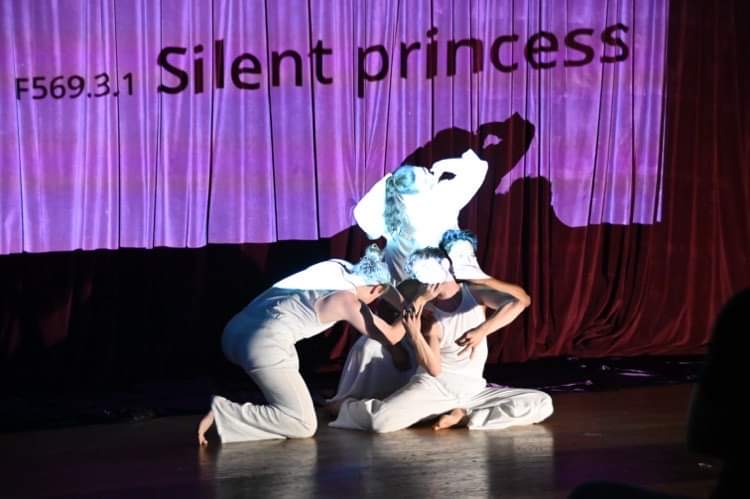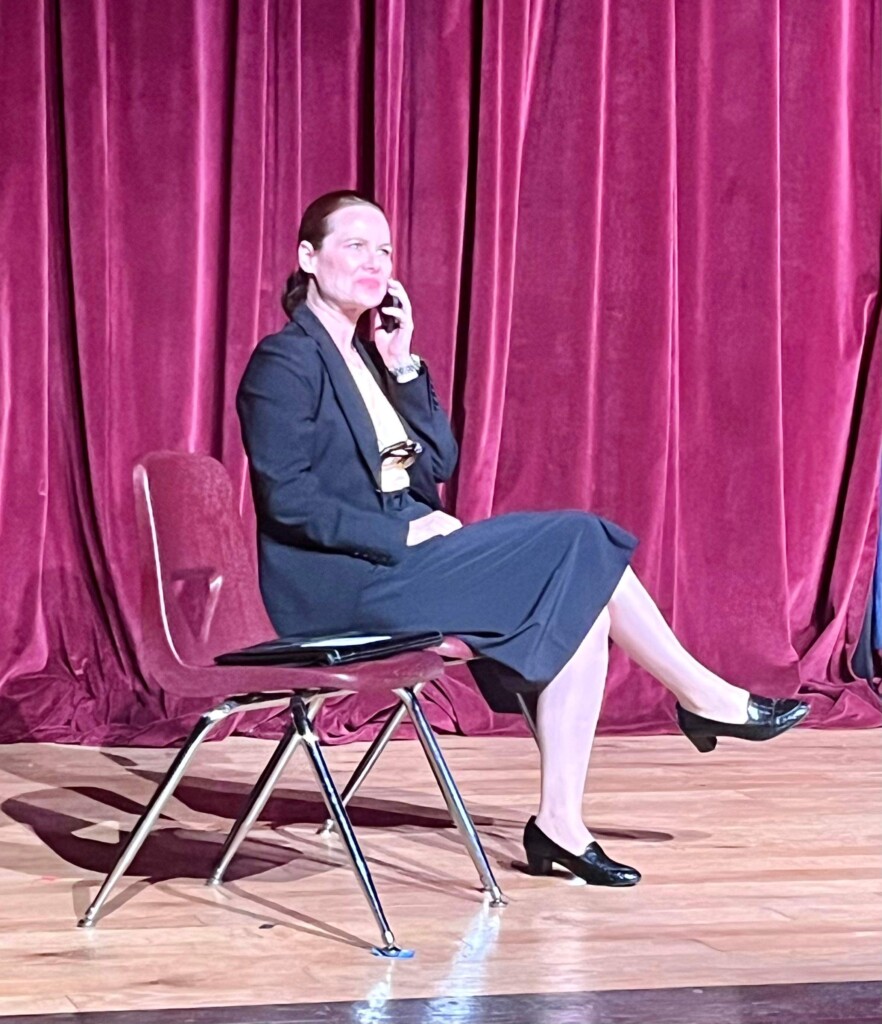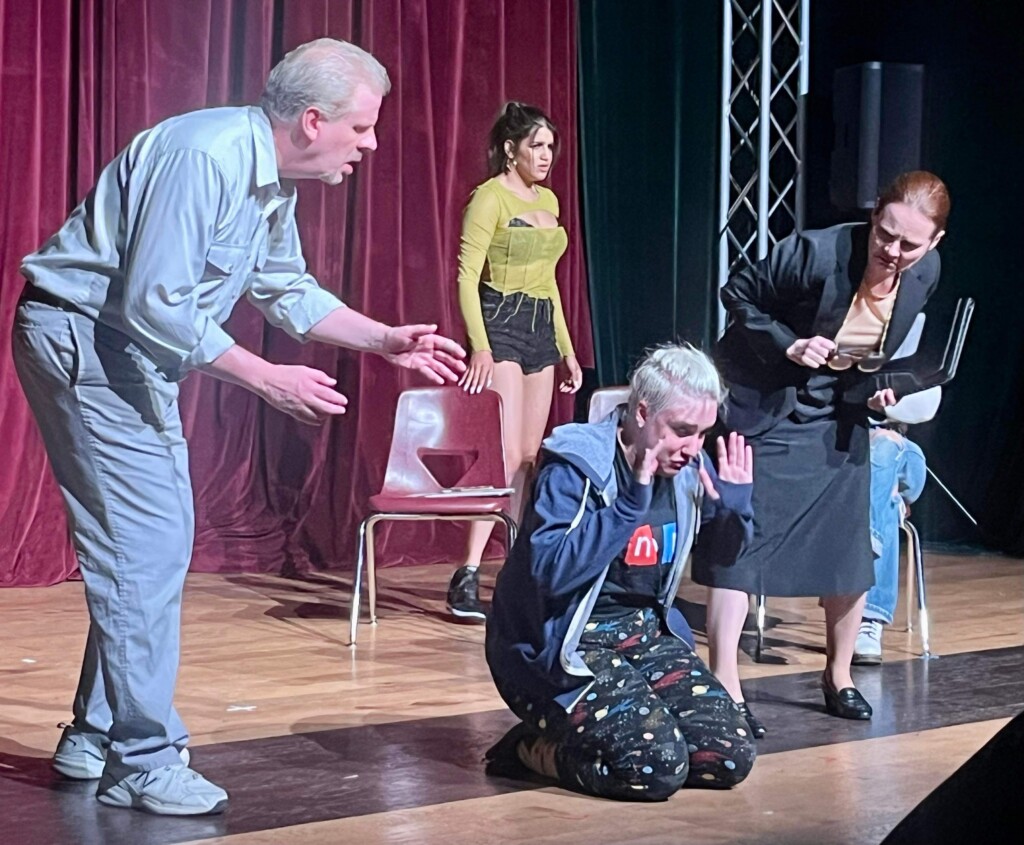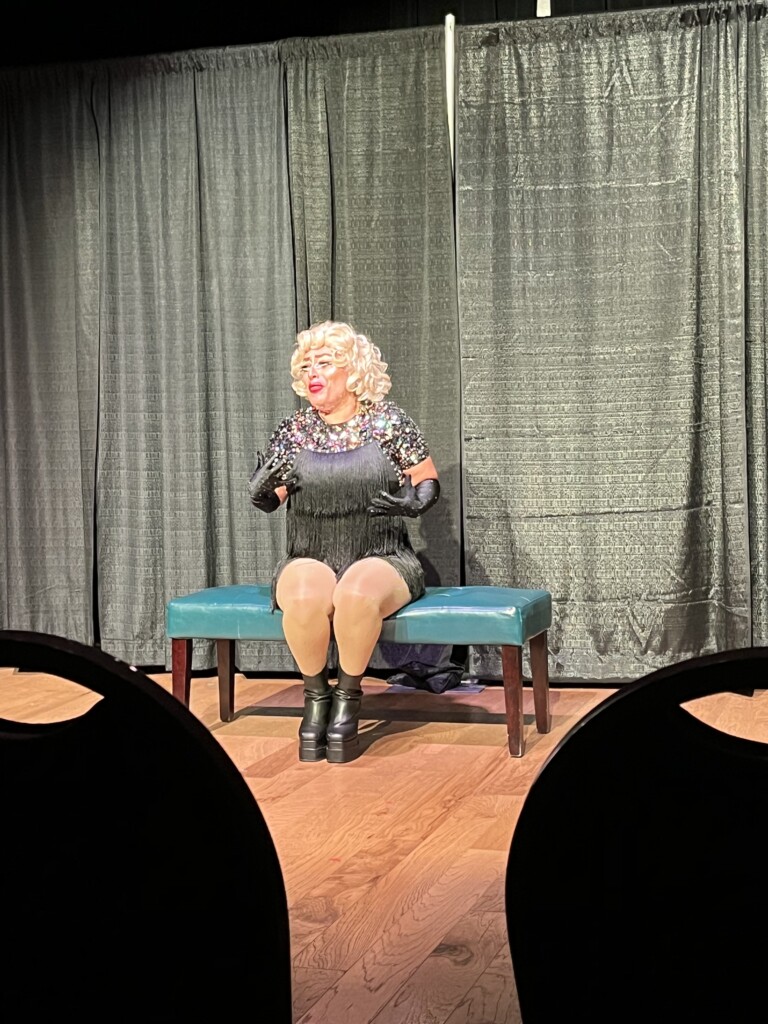With one weekend down and one more to go, the ninth Great Salt Lake Fringe (GSLF) festival sold 723 tickets in the first weekend and, if the trend of previous years follows, sales will pick up substantially when the shows resume Friday through Sunday, Aug. 4-6 in the three venues at the Alliance Theater, which is connected to the Utah Arts Alliance, at Trolley Square.
Each day, GSLF also is selling beer and other cold beverages on the patio garden, near the performing venues.
The Utah Review offers reviews of five shows from the first weekend. With the exception of Bedtime Stories, the other four shows will be available this weekend. There are 20 shows on this year’s GSLF slate.
There also will be free presentations, lectures and workshops for performers and others at the Artist Annex, produced by Scixxy’s Greater Shows.
For more information about tickets and all Fringe events, see the GSLF website.
CANYON COUNTRY
Fringe is an excellent platform for stage readings of plays in development and Liv C. Smith’s (Olivia Buck Smith) Canyon Country is well on its way to becoming a solid attention-grabber, with excellent possibilities of fine tuning the script for a full-fledged professional production. Set in southern Utah, the play, directed by Javier Flores, opens with seven campers who have been stranded by a flash flood. Smith sets her characters covering a broad sociopolitical spectrum. There are three pairs: lesbian couple Jade and Sadie (Macey Shackelford and Comet Higley, respectively); married couple Marcus and Sara (Luke Hardy and Sonia Maritza Inoa-Rosado Maughan, respectively) and Kaden and Wynter (August McVale and Smith, respectively) a young Mormon couple who are engaged. The seventh character is Elias (Isaac Trinidad-Martinez), a Latino who just turned 18 and is setting out for his independence after deeply dissatisfying experiences in foster homes.
In the storm’s aftermath, Elias is the only one who has wood dry enough to keep a fire going. He invites the others to cook their food at his site. Meanwhile, Smith wastes no time in the exposition, allowing the characters to vent their political beliefs on quite a few topics, including abortion, veganism, gun rights, gay rights, marriage, immigration, multiculturalism and religion. While there are layered nuances in the characters, the most strident distinctions are found in Jade, representing the progressive left, and Kaden, for right-wing politics and traditional family roles.
But, amid the rapid-fire debates, Sara is experiencing a medical crisis, with signs of an ectopic pregnancy. The dramatic stakes intensify, as the audience wonders if indeed the group can work together on finding safe passage for Sara to be transported to a hospital.
Smith acknowledges the script needs refinement but its performance emphasized that this play is a diamond in the rough and should be encouraged for workshopping on its way to a full scale production. There are good mixes of humor and levity with the drama, which already suggests an ideal rhythm. The actors found the lines easy to interpret and there are several nice long smooth stretches in the play’s two acts.
Pacing though would be significantly enhanced by pulling back on how quickly the characters lay out their sociopolitical positions. It nearly overwhelms the dramatic structure of the narrative. In addition, the dramaturgy should be expanded and refined. For instance, Sara’s longer dialogue moments seem problematic. The intense pains which are symptomatic of the medical emergency she is experiencing would likely make it difficult to speak at longer length. The references to desert marigolds are good but the background should be double checked to the types which typically flower in southern Utah.
BEDTIME STORIES
A fixture at GSLF over the last several years, the Interdisciplinary Arts Collective, which is based at Westminster University, has provided a different type of theatrical experience, with its trademark fusion of music, dance, poetry and stage elements. This year, Indigo Cook and company presented Bedtime Stories, an outstanding philosophical multimedia collage celebrating magical realism, in the forms of fairy tales and folklore.
The show is an homage to the philosophy of Novalis, a German polymath whose short life barely spanned the transition from the Classical to the Romantic eras. “In a genuine fairy tale, everything must be miraculous, mysterious, and interrelated; everything must be alive, each in its own way,” Novalis wrote. “The whole of Nature must be wondrously blended with the whole world of the Spirit. In fairy tale, the bonds between anarchy, lawlessness, freedom, the natural state of Nature make themselves felt in the world . . . The world of the fairy tale is a world which is opposed throughout to a world of rational truth, and precisely for that reason is it so thoroughly an analogue to a world of rational truth, as Chaos is an analogue to finished Creation.”
Bedtime Stories epitomizes these words in compelling ways, with the ensemble relying on folktale tropes, motifs, archetypes and indices, including sources such as the Aarne-Thompson-Uther and Stith Thompson compilations.
Characters include the Wolf (Sara Caldiero), Vulture Prince (Elijah Cook), Pinocchio (Indigo Cook), Little Red Riding Hood (Megan Fotheringham), the Huntsman (Gray Brian Thomas, who wrote a couple of short tableaux), the Witch’s Revenge (Katelynn Killian), the Goddess (Dani Mendez), Baba Iaga (Amelia Millward) damsel in distress (Jordan Reynosa) and Bluebeard (Nathaniel Woolley). Also involved with the production were Cyan Larson (sculptor) and James Westervelt (video artist).
Likewise, the soundscape matched up with the theatrical tapestry in this collection of a dozen tableaux. The eclectic score included Béla Bartók, Delia Derbyshire, Anthony Newley, Roxy Music, Arooj Aftab and others. Bedtime Stories reminds us of the instructive and spiritual values of experiencing such tales in their true, original forms. With their eerie mysticism, we do not have to become jaded, frustrated or dissatisfied in our quest, particularly in acknowledging that attempting to rational truth does not necessarily lead to full comprehension and lucidity of the world and our experiences.
THE BACCHAE
The ancient Greek tragedies remain conducive to contemporary adaptations, especially Euripides, who was the most prominent atheist playwright of his time. For its first appearance ever at Fringe, Westminster University’s Classical Greek Theatre Festival lab, which was founded in 1971, their adaptation of Euripides’ The Bacchae, a Greek tragedy written 2,400 years ago, resounds convincingly with the intentions of its ancient origins.
Directed by Jack Cobabe, the adaptation slims the original from its normal 95-minute running time (without intermission) into an accessible, clear-cut hourlong rendition, inflected with excerpts from The Trojan Women (also by Euripides), as well as excerpts from Socrates’ trial, as Plato recorded them. The translation sources were Gilbert Murray and Benjamin Jowett, along with materials from Project Gutenberg.
The contemporary social club scenes which bookend the core drama are clever, for anchoring the symbolic significance of two key characters in the tragedy: the god Dionysus, and Agave, the mother of Pentheus, the vainglorious king who gravely underestimates the response to the god’s return to Thebes. Dionysus will spare no violence or revenge as he reclaims the city which had once obstinately opposed him.
In its excesses, wine can produce the tragic elixir of unbridled ecstasy and chaos that will bring irreversible consequences. Agave in the form of tequila and mezcal is sharp and mercurial but also vulnerable to unwitting allegiances and blindness to the seductive pettiness and petulance of Dionysus.
The actors hit their marks. Alvaro Cortez relishes the implacable nature of Dionysus, while Sterling Shane Allen reads properly his role as the young king Pentheus, who is the play’s undeniable tragic protagonist. As Agave, Ellie Otis hits the notes in her famous speech at the end which conveys the Euripidean sentiment about the small-minded shame of the gods while also lamenting the tragic hubris of voluntary ignorance. Mark Fossen is in his usual fine form as Cadmus, the elder who futilely tries to advise and warn the king. The minimalist production also includes a small chorus (Steve Allyn, Zoe Fossen and Zack Nielsen).
SAVAGE RESOURCES
Small theatrical companies can pack a mighty artistic punch, as Immigrant’s Daughter Theatre proves consistently. Their production of the outstanding two-hander play Dreamers by Ariana Broumas Farber and directed by Stephanie Stroud was cited last December by The Utah Review as one of the top 10 moments of the Utah Enlightenment in 2022.
At Fringe, the company has a devilishly good satire of office politics in Savage Resources, written and directed by Ariana Broumas Farber. For fans of Office Space, the 1999 Mike Judge comedy about the slaughtering of souls and career motivation at a software tech company, look for a sleek contemporary dose of scathing humor in Savage Resources. The play is set in the fictitious company of Megadent, where staff members are attempting to navigate a long ignored yet simmering internal office crisis blown wide open during the COVID-19 pandemic.
Megadent has a new human resources director (Tiffani DiGregio), who is up to date on the appropriate conventions of office propriety, including land acknowledgments, pronouns and identities, enlightened attitudes of language and usage and what is appropriate and what is offensive in office communication and behavior.
Meanwhile, the company’s top two sales stars, Megan and Bernie, (Jennica Anasua Galloway and Sam Torres, respectively) are suspicious of the HR director but also are exasperated by Sara, the new hire (Claire Stucki Wilson) whom they feel is out of place and threatens to sandbag their momentum, especially during the pandemic. Then there is Gary Gay (Jeffrey Owen), who has been with Megadent for a quarter of a century and is proud of the work that Megan and Bernie have done. He sees them as his protégés but he also refers to them as kiddos and girls repeteadly. Expectedly, Sara dislikes GG (as he is nicknamed by his colleagues), who sees him as creepy and wants no encouragement from him. GG also is not a fan of Sharon’s HR protocols.
Farber, with tech coordination by playwriting colleague Morag Shepherd, has mastered an invigorating set piece which crackles with an exhilarating rhythm, punctuated perfectly by breaks featuring viral Tik Tok dances, performed by the characters.
Forget those mandatory workplace in-service sessions or web tutorial series with quizzes at the end of each module. Savage Resources would be a better, more instructive, option. The play works for how effectively it captures the realities of office crises and the general distrust and skepticism about human resources’ effectiveness. And, Savage Resources is equal opportunity on how it sets its satirical targets on all five characters. The play reminds just how indispensable everyone really is.
Megadent’s problems did not arrive with Sharon, the new HR director. The disaster could have been avoided. Human resources often have viewed employees as serving the bottom line and not else. GG would have preferred an older generation gatekeeper to ensure that the “don’t-rock-the-boat” mentality. Thus, it becomes apparent why Sharon’s arrival is seen as more horrible than helpful, save for the company’s founder. Farber and the cast give a fine read on these problems, ranging from corporate bias being prioritized in HR strategizing to unequal treatment of colleagues and the lack of visibility and transparency in office communication and behavior.
ROXIE HART SYNDROME
One of the out-of-state newcomers to GSLF this year, Casa Ivium‘s Roxie Hart Syndrome is a compact entertaining This drag queen show — as Pam Galleg Oz, co-founder and artistic and academic director of Casa Ivium, describes it — is a fine interpretation of some of the history and the actual crime drama behind the story of Roxie Hart, a character from the Broadway musical Chicago.
Galleg Oz has done her homework and it’s a smart contemporary sendup. She has channeled the story of Beulah Annan, the woman at the center of one of the most sensational crime stories during the 1920s in the Midwest metropolis, along with the fictitious rendering of her as Roxie Hart.
Annan, who was twice married, had taken up with a handsome gentleman and, in 1924, she confessed to killing him, while claiming that the she did so in self-defense because he tried to rape her. While he lay dying, she put on a recording of the Hula Lou foxtrot and danced to it, before calling the police.
The details were chronicled by Chicago journalist Maurine Dallas Watkins, who described the woman as such: “They say she’s the prettiest woman ever accused of murder in Chicago — young, slender, with bobbed auburn hair; wide-set, appealing blue eyes; up-tilted nose; translucent skin, faintly, very faintly, rouged, an ingenuous smile; refined features, intelligent expression—an ‘awfully nice girl’ and more than usually pretty.” Watkins would later write a novel that eventually would become a source for Chicago, despite the journalist’s repeated refusals of Bob Fosse’s requests.
This became the idealized portrait of the ingénue, the type who captivated the imaginations of writers, producers and backers of Broadway shows. Galleg Oz dons a blonde wig, kinky boots and plenty of makeup, in portraying a performer willing to do anything to leave behind her blue collar life for the neon lights of Broadway. There is just the right tinge of awkwardness and clumsiness in her movement and poise, which makes the performance spot on for a woman who has the impossible dream of making it on the world’s most famous musical stage. And, bonus points for the cheesy but spot-on routine at the opening with a pair of Hula Hoops. The script for Roxie Hart Syndrome is penned by Petter Zhan.
Based in Mexico in La Paz, Big California Sur, Casa Ivium is a multidisciplinary artist with more than 20 years of performing experience. Galleg Ox has collaborated and shared her work as an artist, performer, creator and producer in different states of the Mexican Republic as well as internationally in Chile, Argentina, Italy, France and other countries. Proceeds from the Fringe show are being donated to the Utah Pride Center.



